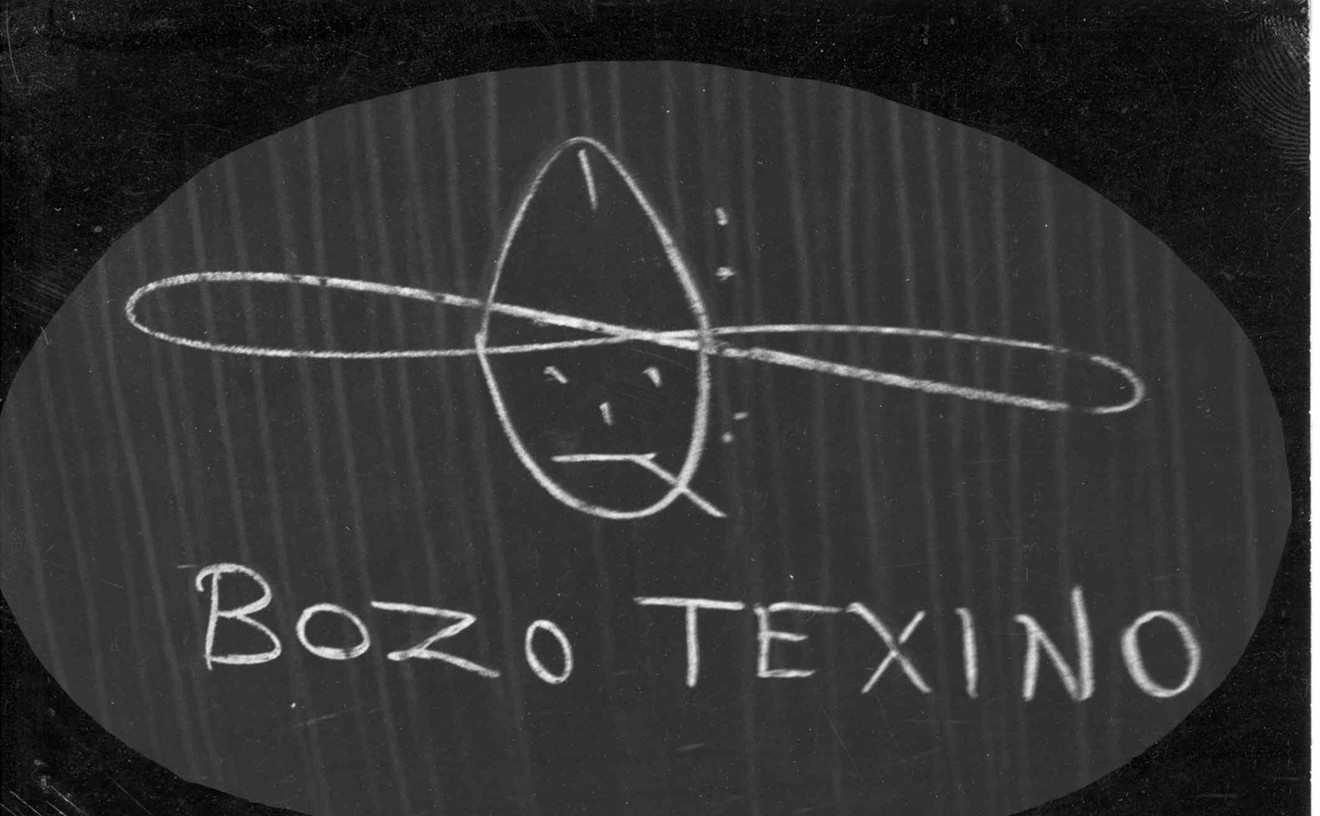Westword: Let's start with the obvious: Tell us a little about yourself and your history in game design. Nate Hayden: I grew up in Colorado. Went to school in California for filmmaking and didn't finish. I worked in the special effects industry for a few years, made a band, traveled around and found gaming after the band. I played a bunch of games with friends and met a guy named Keith Meyers at a game group. He is a professional game designer and was going to teach a class on game design at Metro. I took the class, just to check it out, and found that the process of game design was intuitive for me. I began play testing my first game (San Quentin Kings) in that class. After two years of testing, I sold my game at a convention in Germany known as Essen Spiel. Sales were okay, and some people seemed to enjoy it.
After that, Keith had me design a couple strategy games, one based on horse racing and another based on a popular book. In the meantime, I made a couple other designs, one that I sold at the latest Essen Spiel 2010 called After Pablo, based on the events that took place in the Mexican and Colombian cocaine trade after Pablo Escobar was killed in the '90s.
Now I'm working on another game called Cave Evil. This is a collaboration with two other designers, Mat Brinkman, and Jochen Hartman. It is a dungeon crawl, war style strategy game about evil wizard necromancers in a cave underworld crypt kingdom. It should be complete in the fall of this year.
WW: Can you talk a bit about the beginning stages of doing board game design? NH: For me, the design process usually starts with the idea of the story or theme, whether it's a game someone else needs me to do or my own idea. I'll usually brainstorm about it for a few months, trying to understand what the mechanics of and functions might be.
I'll meditate on a certain idea for a long while and try to translate the functions of the idea into game mechanics. I'll jot some stuff down until I'm finally ready to make a first play test. Around this time I usually find it's very important to actually have the goal of the game in mind, but sometimes I'll leave it open for awhile until I get further along. It could be different every time, but the above seems like a pattern so far.
WW: From there, what goes into it; i.e., how much is play testing, producing, doing art, promotion and so forth? NH: Once a first play test is made, I begin testing the design ideas over and over. The initial play test is usually a mess of ideas you want, but it's a total disaster as a game. I will try to find the elements I like and eliminate the ideas that don't work. This process will go for many months and years. I see it as sort of psychological sculpting. Gaming is largely a psychological experience, many mental choices are performed, everyone agrees to an imaginary rule set, the world and quandaries created are also imagined. So the testing process is like a filtration of what I may think is the most enjoyable mental experience of the particular game.
If I'm dealing with an independent publisher, the next steps would be to begin making art that matches the theme of the game, and also figuring out icons that help gamers understand important game functions. This can take several months too, depending on what you want your game to look like.
During this phase, you could begin promoting the game or alerting other gamers on popular sites such as Fortress Ameri-trash and Board Game Geek or whatever site has the game style you're making. Also, a key component would be visiting and selling stuff at major gaming conventions. It's not unlike independent filmmakers trying to promote their films in conventions.
WW: Can you talk a bit about the difference between strategy/designer board games and party games, and maybe talk about where you would suggest people start if they're looking to get into something more complex and interesting than Risk or Monopoly? NH: As far as getting into gaming, it really depends on what you want. I like hanging out with friends, exploring worlds together while trash talking and getting wasted or whatever. Strategy gaming can be a fantastic learning tool and great bit of escapism. You are usually in a role of whatever the game is. If the game is done well, the choices you have to make will relate mechanically to the choices of the actual people in the story. For instance, you could be the general in World War II making decisions for your troops, or a railroad baron making the best routes, or a mean wizard deciding if you should chop down a blood beast in an ancient cave. A game's ending is never the same. We can all experience the imagination together, face-to-face, there's a great social interaction that occurs.
If someone wants to just have a fun time, with lots of laughs, but not so much brain burning, they may enjoy party gaming. Or if they want to really get into organizing troops they could play advance war gaming simulations. I think there is a type of gaming for everyone.
If someone wants to get into a type of gaming, I recommend visiting a store that sells games. Look around, talk to people there, and see if anything there looks interesting to you. If it does, try to buy a game that is simple to understand at first. I could recommend some titles, but go with what looks interesting and ask people there if it is simple enough to understand. Some games can be very rule heavy, and it's good to familiarize yourself with reading and teaching rules with something easier to understand.
One element that keeps people away from gaming is the fear of reading and learning rules. It's kind of a shame, but I also think it's great. Reading rules is like the password to getting into a fantastic world of imagination. If a person does not want to read or learn rules, they will never enter into this private club of imagination. Their loss, really. The club is not exclusive, it just demands one thing from a player: the patience to learn or read rules. If they can not do that, they don't get in. Video games have a much more friendly approach to learning gameplay, a tutorial. Face-to-face gaming requires someone to learn and teach rules. After initiating yourself into that process, it really becomes simple and obvious that it's just a matter of doing it for some people.
Rather than taking a risk on buying a game, a person could also visit one of the many local game groups. I help run a group every Monday at the Whittier Community Center at 29th and Downing. We meet at 6 p.m., and it's a good way to gauge if this is the type of gaming for you. There are other strong groups in Broomfield, Littleton and Park Meadows.
WW: And lastly, if someone wanted to become a game designer, where should they start? NH: I really thought Keith Meyers taught a great class. He explained the whole business, as it stands, so well. If anyone wanted to become a designer, I guess it would depend on what type of gaming they wanted to design. I would say play as many games as you can and become familiar with the vocabulary and language of mechanics. My friend Harald Enoksson (designer of Longships and 2010 Swedish Parliament) doesn't play a ton of games, and just invents entirely new systems from scratch, so I'm not sure what is best. Finding what works best for you is probably the best advise, but the key for all styles would be you must play test. Play testing is what really makes a game; it's strange and vulnerable at first, but necessary.
WW: What board games do you enjoy? NH: I tend to enjoy games that have a theme experience. I enjoy learning about something or feeling as though I'm in the role of whatever it is I'm playing. I also enjoy heavy fantasy elements. Reality is a joke. Political, religious and economic ideas are a sort of theme and game rule set designed by philosophers, politicians and so forth, and modern civilization sort of collectively agrees about this stuff, so the further I can escape from this rubbish with gaming the better. I find heavier games and RPGs work very well for this escapism. Top Games:
- Warrior Knights: A nice empire managing game, slow moving, but dripping with theme. You are a baron of an imaginary kingdom not unlike the middle ages and must manage troops, cities, policy and economy.
- Siena: Nice little story played on a classic Italian painting. Players begin as peasants and can become merchants and bankers. A strange little economy game.
- Runebound: A relatively simple adventure game, basically playing an entire D&D campaign in one sitting.
- Revolution: The Dutch Revolt: Very subtle strategy and mechanics. Probably a designer's game more than a consumer game. Educational to it's time period.
- Twilight Struggle: Very well integrated education and theme regarding the Cold War. Very tense from beginning to end.
- Warangel: Unbelievable independent design from Italy. The designer did all the art himself. Incredible creature characters in this one.
- Magic Realm: Very difficult game. Sort of a commercial disaster of a board game made at the beginning of the D&D craze. The guy who made it designed a system that interacts like no other. Very unapproachable game, but worth the effort to understand.
- High Frontier: This is brand new, similar in difficulty to Magic Realm. A simulation of space exploration, designed by an astrophysicist. Unbelievable design.
- Die Macher: A favorite among friends. About the German election system, a four-hour game which puts you in the role of a power broker in a German election.
- D&D 1st edition: Definitely rough version of what RPG games are now, but the narrative in the original is so worth it.










